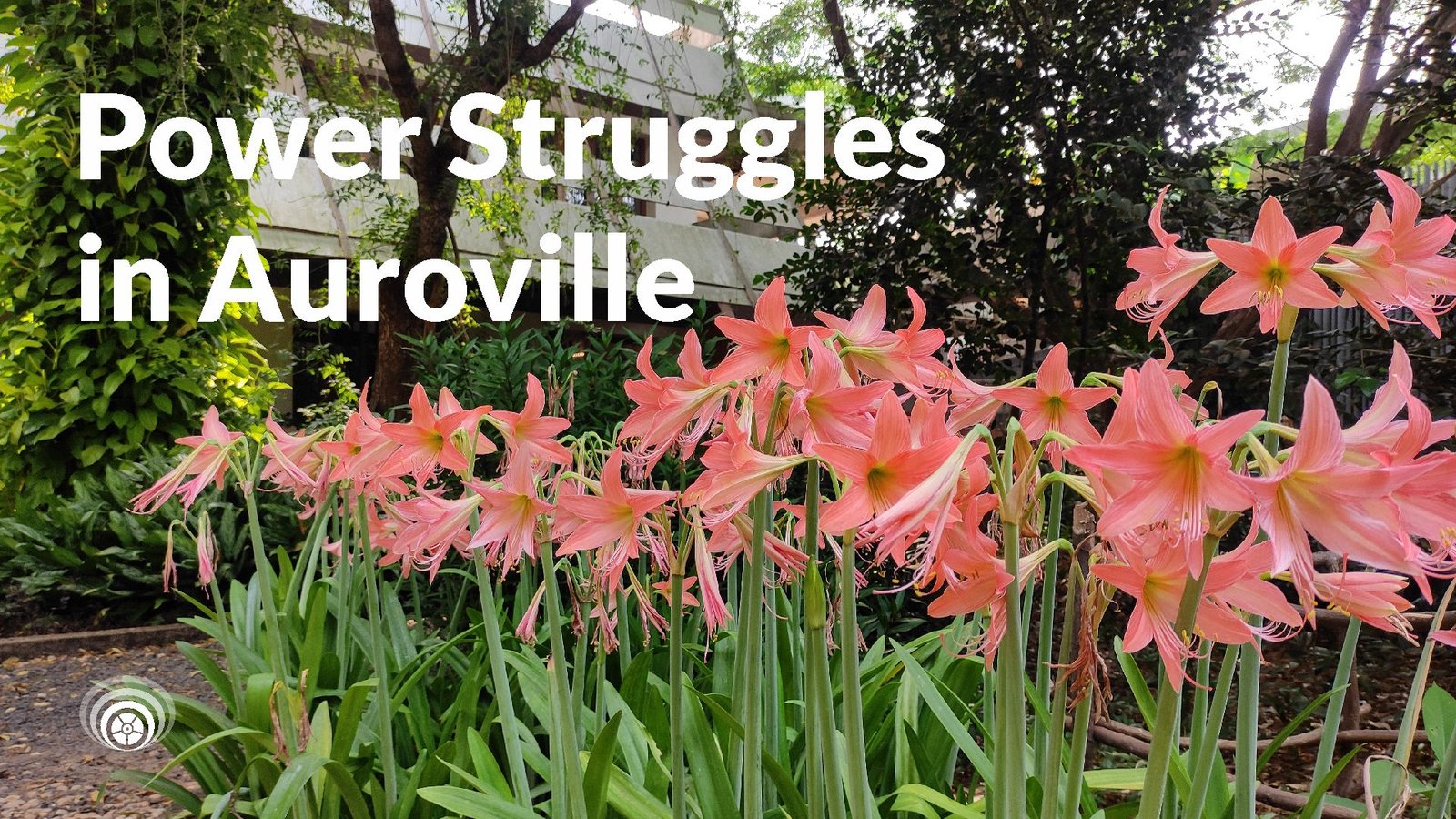
Auroville faces a critical choice: continue internal power struggles or embrace collaboration. With the Government of India and courts reaffirming the Governing Board’s authority, resisting is futile. The era of influential foreign families’ control has ended, and hypocrisy must stop. Only Truth can manifest Auroville’s founding Vision of Human Unity and Progress.
The internal conflicts within Auroville have reached a boiling point, where multiple factions are clashing over governance and the future direction of the collective. The recent Court decision is telling of this tale. On one side, the petitioners — Working Committee of the influential families of Auroville — are challenging the legitimacy of the respondents, who are part of the Working Committee recognized by the Governing Board of the Auroville Foundation (appointed by the Government of India). This battle has spilled into the courts, leading to multiple legal disputes, including the recent Quo Warranto and perjury cases, which were dismissed by the Madras High Court.
At the heart of the issue lies a deeper struggle for control and influence. The petitioners argue that the Working Committee recognized by the Governing Board is illegitimate since it wasn’t selected by the influential families posing as RA, though Auroville Foundation Act stipulates it as a RA function, without defining how RA would climb the stairs. Meanwhile, the respondents, backed by the Governing Board, claim to be the rightful representatives, acting in accordance with the law and with the Government of India’s mandate. This power struggle between the influential families and the Governing Board is emblematic of broader issues facing Auroville — conflicting visions for its future, resistance to change, and an unyielding thirst for control among a small but influential group of residents.
The Madras High Court’s dismissal of the cases, along with its recognition of the Governing Board’s authority, should serve as a wake-up call for all parties involved. Here are four key points that underline the current crisis and the path forward for Auroville.
Fighting the Government of India is Pointless: Collaboration is Key
Auroville cannot exist in isolation from the Government of India. The Governing Board, appointed by the central government, holds significant power and responsibility for ensuring that Auroville functions within the framework of Indian law and in alignment with its founding ideals. Fighting the Governing Board through repeated legal challenges, as the petitioners have done, is counterproductive. The Madras High Court’s ruling reaffirms the Board’s authority, and the court’s repeated calls for finalizing regulations highlight that the governance of Auroville is a matter that needs resolution through collaboration, not conflict.
Resistance to the Governing Board, which acts under the mandate of the Auroville Foundation Act, is not only futile but also risks undermining the very stability of Auroville. Engaging in a power struggle with the government will not yield positive results. Instead, what is needed is a cooperative approach, where all stakeholders, including the Governing Board, RA, and other collective members, work together to manifest the true vision of Auroville.
As residents of Auroville, we need to proactively find means and ways to Organise RA before it is too late to act.
Also, it is worthwhile to note, GB and the Government cannot manifest Auroville in full either. What is brick and mortar, without dreams and spirits? No amount of Officers on Special Duty can perform what an inspired willing servitor can accomplish. Thus, the situation makes for a good argument to find synthesis and harmony amidst the prevailing chaos.
Hunger for Power Has No Place in Auroville
Auroville was founded as a place where Human Unity, spirituality, and a collective aspiration for a better future would take precedence over individual ambitions. Unfortunately, the current conflicts reveal a deep hunger for power among certain factions within the collective. The prolonged legal battles, personal attacks, and refusal to compromise reflect an ugly side of Auroville’s internal politics — a thirst for control that runs counter to the principles on which Auroville was founded.
The ongoing disputes have distracted Auroville from its higher goals and have only served to develop division, distaste and discord. Auroville’s organisational work should not be about personal gain, influence, or status; it should be about the collective good of the collective. The hunger for power must be put aside, and those involved must recommit to serving the ideals of Auroville rather than their own interests.
The Era of Foreign Families Controlling Auroville is Over
For the past five decades, Auroville has been dominated by a few influential foreign families – with a few Indians as facade – who have exerted significant control over its governance and direction. These families, entrenched in positions of power, have resisted efforts to engage the collective and have often manipulated internal processes to maintain their influence. However, this era is coming to an end. The Madras High Court ruling, along with the increasing involvement of the Government of India through the Governing Board, marks a significant shift in the balance of power within Auroville. The current chaos in Auroville is merely a reaction of the influential families coming to terms with reality that they are not the ultimate power in Auroville. The sooner they settle with reality, the better it is for those who are suffering because of the influential families.
The time when a select few could control Auroville without accountability is over. Thanks to the invitation of the same influential families who invited the PM for the 50th anniversary of Auroville in 2018, the Indian government has now a vested interest in ensuring that Auroville lives up to its potential as an international township, and it will no longer allow a small group of residents to monopolize its control. The broader collective, including all residents of Auroville, must be allowed to participate fully in Auroville’s future, and any attempts to cling to past power structures will only lead to further isolation and irrelevance for those who resist change.
Hypocrisy, False Propaganda, and Playing to the Gallery Must Stop
There has been a consistent pattern of hypocrisy and false propaganda on the part of some factions within Auroville, particularly in their communications with the collective and the wider public. These groups present themselves as defenders of Auroville’s ideals while simultaneously engaging in power plays, legal obstruction, and divisive tactics. Playing to the gallery, using emotional appeals, and spreading misinformation are not the ways to resolve Auroville’s governance issues. It is time for honesty, transparency, and a genuine commitment to the collective well-being of the community.
The recent note from the petitioners, for example, frames the dismissal of the Quo Warranto case as a technicality, but the court’s judgment clearly supports the legitimacy of the current Working Committee recognized by the Governing Board. Such misleading narratives only serve to deepen divisions and prolong the conflict. It is time for all sides to stop the posturing and focus on solutions that benefit the entire collective.
Moving Forward – Collaboration or Consequences ?
Auroville stands at a crossroads. It can continue down the path of conflict, division, and power struggles, or it can choose the path of collaboration and unity. The court has made it clear that the Governing Board, appointed by the Government of India, holds legitimate authority. If the residents of Auroville continue to resist this reality, they risk further legal and political consequences, including the possibility of amendments to the Auroville Foundation Act that would give the government even greater control over the collective.
It is time for Auroville’s residents, particularly those who have been fighting against the Governing Board, to recognize that collaboration is the only way forward. The vision of Auroville as a place for Human Unity and Higher Aspirations can only be realized if the collective works together, guided by Grace. Continued resistance and infighting will only lead to further instability and the potential loss of Auroville’s unique status as an international township.
The message from the Government of India and the courts is clear: work together, or face the consequences. Auroville’s future depends on its ability to come together as one collective, setting aside personal ambitions and past grievances, to manifest the ideals that it was founded upon.





